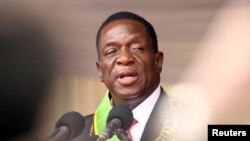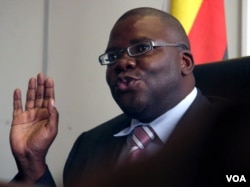In hopes of reviving the ailing economy, Zimbabwe's government has set out to repatriate as much as $1.4 billion it says was transferred abroad illegally in recent years.
President Emmerson Mnangagwa released a list of companies this week that have not cooperated with his campaign. He said more than $820 million has yet be returned, despite an extension of a three-month amnesty period that began in December.
Tendai Biti, an opposition leader and Zimbabwe's former minister of finance, says the issue of externalizing funds ended in 2009 when Zimbabwe abandoned its worthless dollar and adopted a multi-currency system which is largely dominated by the U.S. dollar.
"The U.S. dollar is legal tender in this country," Biti said. "When you talk of externalization, you are talking of getting foreign currency — money which is not legal tender of that country outside Zimbabwe. The key problem to our economy is not the money which has been externalized … it's because we are not producing. [We] are not exporting, and when you are exporting we cannot earn foreign currency receipts."
But Terence Mukupe, Zimbabwe's deputy minister of finance and economic development, says repatriating money is key to revitalizing Zimbabwe's long-struggling economy.
"That $800 million on the list is real," Mukupe said. "Imagine $800 million coming into the country's nostro accounts? It makes a huge difference. We are talking of a quarter of our import bill. If we are able to bring back a billion dollars, guess what it does for the ordinary person? It changes lives of people."
Agency Gumbo, a lawyer, said the government must find a way to encourage companies to return their funds besides threatening them with lawsuits.
"I agree that externalization is part of the problem we are having in this country, but let's look at the legal regime we have set up and see whatever we are putting on the table, is it going to be enforceable in the future?" he said.
He agreed with Biti that since Zimbabwe adopted the U.S. dollar as part of its currency, externalization charges might not stick in court, should Mnangagwa's government decide to prosecute.
Gumbo also noted that some of the companies listed as having externalized money were struggling to have their customers pay them.





